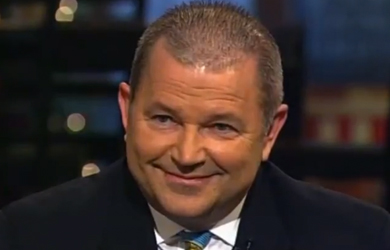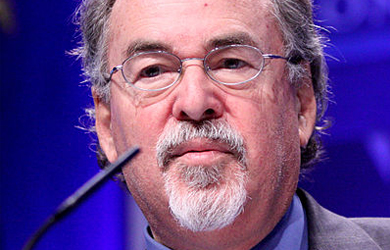Yesterday, we noted that a top Southern Baptist Convention official blasted David Barton and Kenneth Copeland for their “profoundly ignorant” comments on soldiers with Post-Traumatic Stress Disorder (PTSD). Barton and Copeland advised soldiers not to look for psychosocial help, and instead can simply “get rid of” PTSD by reading the Bible because they are God’s warriors. Joe Carter, the communications director for the SBC’s Ethics & Religious Liberty Commission, elaborated in a blog post for The Gospel Coalition.
He calls the two right-wing speakers “fools” who are “among the last people who could be relied on to intelligently interpret a text,” adding: “Their mishandling of Scripture is inexcusable, but what makes it unconscionable is they use God’s Word to shame and berate veterans with PTSD.”
“Barton is still, inexplicably, trusted by many conservative evangelicals, he has himself built his reputation on twisting and misrepresenting historical documents for ideological and propagandist purposes,” Carter writes. “For Copeland and Barton to resurrect this ‘blame the victim’ trope and coat it with the veneer of Biblical warrant is Satanic.”
“Answer not a fool according to his folly, lest you be like him yourself. Answer a fool according to his folly, lest he be wise in his own eyes.” Proverbs gives us two approaches and expects us to use wisdom in knowing when they should be applied.
How then should we answer the fools Copeland and Barton? While it is tempting to ignore them completely, I believe that would be a mistake. Had they merely proffered another laughably inept reading of the Bible, it would have hardly been worthy of notice. Throughout his career, Copeland has been accused of various heresies, most of which he created through his inept handling of Scripture. And though Barton is still, inexplicably, trusted by many conservative evangelicals, he has himself built his reputation on twisting and misrepresenting historical documents for ideological and propagandist purposes. They are, in other words, among the last people who could be relied on to intelligently interpret a text.
Yet many people will erroneously believe that Copeland and Barton speak as experts on the Bible and that their interpretation is the natural result of a literal or inerrant view of Scripture.
To those who are unclear on that point, let me express what I believe is the shared opinion of Biblical scholars, intelligent laymen, and just about anyone else who has ever bothered to read the Bible: Copeland and Barton’s application of Numbers 32:21-22 to modern veterans suffering from PTSD is one of the most profoundly stupid interpretations ever uttered.
When those verses are read in the context of the chapter, and in the context of book of Numbers, and in the context of the Old Testament, and in the context of the entire Bible, it becomes almost impossible to imagine how anyone with an elementary school level of reading comprehension could have come up with such an interpretation.
…
Their mishandling of Scripture is inexcusable, but what makes it unconscionable is they use God’s Word to shame and berate veterans with PTSD. Barton and Copeland imply that PTSD is due to guilt over actions carried out in wartime that leads to self-condemnation. This is a profoundly ignorant view of both the causes of combat-induced PTSD and the motivations behind medical and psychological based treatment.
PTSD is psychological trauma that can change how the brain and mental processes function. While in combat, veterans are exposed to the stresses of hyper-violence while living in a near constant state of hyper-vigilance. As psychiatrist Jonathan Shay explains in Achilles in Vietnam: Combat Trauma and the Undoing of Character:
A human enemy strikes not only at the body but also at the most basic functions of the human mind. The Vietnamese enemy defeated the soldier’s perception by concealment and his ability to understand what he saw by camouflage. The basic mental state of intention and will was attacked by ambush, deception, surprise, and anticipation . . . . The cumulative effect of prolonged attacks on mental function is to undermine the soldier’s trust in his own perceptions.
On returning from combat, the veteran is no longer exposed to violence, yet the reflex for hyper-vigilance — whether conscious or subconscious — may remain intact and beyond the person’s control. “Exposed to continuous threats of warfare,” says Shay, “the body remains mobilized for battle indefinitely.” Veterans suffering from PTSD can lose some of the authority over mental processes, such as perception and memory, which civilians take for granted.
Throughout most modern wars, from World War I to Vietnam, both the military and civilian worlds denied or downplayed the existence of this form of psychological trauma. It wasn’t until the post-Vietnam era that the medical community began to recognize that experiences of PTSD sufferers were not only real, but also that the causes were likely rooted in genes and brain chemistry, rather than a defect in the veteran’s character.
For Copeland and Barton to resurrect this “blame the victim” trope and coat it with the veneer of Biblical warrant is Satanic. Christians need to counter this demonic, gospel-destroying message by letting the men and women who are suffering from combat related PTSD know what the Bible really says about hope, healing, and deliverance through Christ Jesus.








